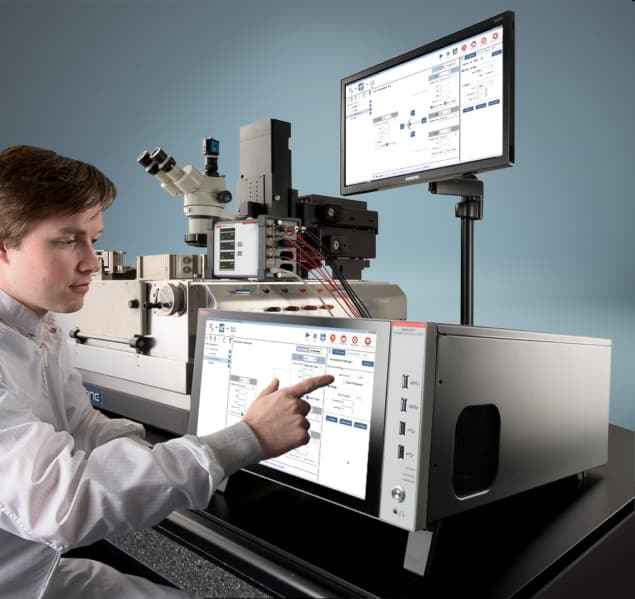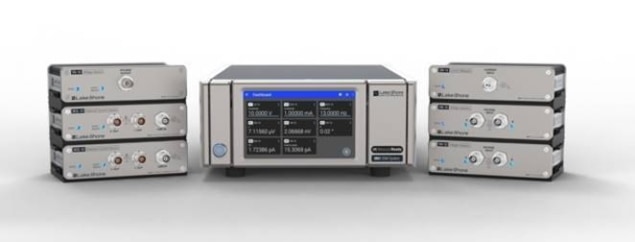APS March Meeting set to reconnect the global physics community
10 Mar 2022 Sponsored by APS March Meeting exhibitors
Thousands of physicists will once again have the opportunity to share ideas and discuss their latest results at the March Meeting of the American Physical Society
Two years ago, the American Physical Society (APS) was forced to cancel its annual March Meeting at the last minute due to the escalating COVID-19 pandemic. For the first time since then, the APS will once again convene the largest scientific conference for the global physics community, with thousands of delegates expected to converge in Chicago, Illinois, from 14 to 18 March 2022.
“The annual March Meeting is a signature APS event that attracts a diverse international community,” comments David Campbell of Boston University, the programme chair of this year’s meeting. “Around 10,000 scholars will present and exchange ideas at the cutting edge of current physics research, and will offer the next generation of physicists an insight into many exciting career opportunities.”
Hundreds of parallel scientific sessions will run throughout the week, supplemented by pre-meeting short courses, networking events, career development opportunities, and dedicated activities for students. The Kavli Foundation Special Symposium on 17 March is entitled “Why Physics is Fun, Stimulating and Can Improve Lives”, and will feature a number of high-profile speakers such as Carlo Beenakker from Leiden University in the Netherlands and Ulf Leonhardt from the Weizmann Institute of Science in Israel.
Virtual registration is also available for anyone unable to travel to Chicago. Invited sessions, tutorials and short courses will be live-streamed and captured for on-demand viewing, while all presenters are being encouraged to upload a video of their talk that will be made available to all registered participants. Poster presenters will also have the option of uploading a five-minute audio explanation of their work.
Those delegates who make it to Chicago will have the opportunity to engage with vendors and technical partners in the exhibit hall, and to learn about the latest innovations in instrumentation and software. Some of the latest product releases that will be presented at the APS technical exhibit are highlighted below.
Innovation drives electrical test and measurement
Tektronix and its subsidiary Keithley Instruments will be demonstrating a range of electrical test and measurement solutions for applications in quantum science, semiconductor devices and condensed-matter physics.
In the quantum space, the company’s arbitrary waveform generators (AWGs) and high-speed digitizers have been optimized to support the channel density and precision radiofrequency signals needed for the latest qubit systems. Instruments such as the AWG5200 can compensate for the negative effects of fixtures and connectors to ensure that qubits receive maximum fidelity from the wide-bandwidth signals produced by the 16-bit vertical resolution signal generator. Meanwhile, low-profile digitizers like the LPD64 offer the full capability and performance of Tektronix oscilloscopes – including a unique capability for simultaneous radio-frequency and time-domain analysis, called Spectrum View – in a fraction of the space. Keithley’s 4200A-SCS Parameter Analyzer can control automated probe stations for precision electrical characterization of semiconductor materials and devices. (Courtesy: Tektronix)
Keithley’s 4200A-SCS Parameter Analyzer can control automated probe stations for precision electrical characterization of semiconductor materials and devices. (Courtesy: Tektronix)
 Keithley’s 4200A-SCS Parameter Analyzer can control automated probe stations for precision electrical characterization of semiconductor materials and devices. (Courtesy: Tektronix)
Keithley’s 4200A-SCS Parameter Analyzer can control automated probe stations for precision electrical characterization of semiconductor materials and devices. (Courtesy: Tektronix)For semiconductor devices, the Clarius+ suite of software included with the popular Keithley 4200A-SCS Parameter Analyzer now provides even more pre-configured tests and supporting information, enabling faster setup and allowing students to work more independently. A new 1/f noise measurement has been added for characterizing 2D semiconductor devices, while a series of tests developed in collaboration with customers is now available for biological FET-based sensors.
Meanwhile, Keithley’s range of electrometers and low-resistance measurement setups offer precision and reliability for extreme electrical measurements in condensed matter physics and materials science. A new capability for acquiring multi-terminal electrical measurements allows researchers to use their bench-top equipment to perform more advanced characterization faster than ever before – and without the need for any custom programming.
Also on display will be Tektronix’s latest oscilloscope, the 5 Series B MSO. This scope offers maximum flexibility – including advanced signal-specific measurements and a broad range of active, differential, isolated and current probes different signals and devices – and features an award-winning, easy-to-use interface.
Visit Tektronix and Keithley Instruments at booth #304
Lock-in measurement system offers precision for cryogenic applications
New from Lake Shore Cryotronics is the M81-SSM (Synchronous Source and Measure) System, which provides tightly synchronized DC and AC sourcing with both DC and AC measurement – including lock-in amplitude and phase detection. The system has been optimized for low-level, precision electrical characterization of materials and devices. Lake Shore Cryotronics’ M81-SSM integrates up to three source and measure channels into a single test system. (Courtesy: Lake Shore Cryotronics)
Lake Shore Cryotronics’ M81-SSM integrates up to three source and measure channels into a single test system. (Courtesy: Lake Shore Cryotronics)
 Lake Shore Cryotronics’ M81-SSM integrates up to three source and measure channels into a single test system. (Courtesy: Lake Shore Cryotronics)
Lake Shore Cryotronics’ M81-SSM integrates up to three source and measure channels into a single test system. (Courtesy: Lake Shore Cryotronics)Designed to eliminate the user complexities associated with setting up multiple single-function instruments, the extremely low-noise system ensures synchronized measurements from up to three source channels and up to three measure channels in a single M81 instrument. Owing to its modular/distributed architecture, the system allows signal and source amplifiers to be located as close as possible to the sample, which minimizes signal wiring, reduces noise and increases measurement sensitivity.
The M81-SSM easily integrates with cryogenic probe stations and other low-temperature systems, allowing simultaneous measurements of multiple devices operating at different amplitudes and/or frequencies. At APS, Lake Shore will demonstrate how the M81-SSM, when combined with its BCS-10 differential current source and CM-10 current measure modules, can be used to stimulate and measure small detector photocurrents of a diode mounted in the company’s VNF-100 cryostat when illuminated by a laser source.
In this setup, the source is driven by the BCS-10 module and optically modulated by a chopper wheel, with the resulting modulated photocurrent measured using lock-in detection by the CM-10 module mounted to the cryostat. Similar setups can be used for external quantum efficiency and many other multi-channel, mixed-signal applications.
To find out more, visit Lake Shore Cryotronics at booth #700
Intelligent AFM automates the imaging process
The Park FX40 from Park Systems is an autonomous atomic force microscope (AFM) with built-in intelligence. By integrating innovative robotics and machine learning throughout the system, the Park FX40 is the first AFM to fully automate all of the up-front setup and scanning processes. This includes automated probe exchange, probe identification, beam alignment, sample location, tip approach and imaging optimization – making time-consuming manual processes a thing of the past. The Park FX40 is a new class of AFM with built-in intelligence and autonomous operation to make the researcher’s job easier. (Courtesy: Park Systems)
The Park FX40 is a new class of AFM with built-in intelligence and autonomous operation to make the researcher’s job easier. (Courtesy: Park Systems)
 The Park FX40 is a new class of AFM with built-in intelligence and autonomous operation to make the researcher’s job easier. (Courtesy: Park Systems)
The Park FX40 is a new class of AFM with built-in intelligence and autonomous operation to make the researcher’s job easier. (Courtesy: Park Systems)The system’s autonomous operation enables scientists to measure more samples more quickly, rapidly generating publishable data and accelerating the research cycle. Automating the manual processes also allows untrained researchers to perform formerly training-intensive tasks, while trained researchers have time freed up to focus on their specialized experiments.
Park Systems has also upgraded many of the AFM’s key aspects, including electromechanics for much reduced mechanical noise, smaller beam spot size, improved optical vision and a multi snap-in sample chuck that can hold up to four different samples. Meanwhile, unique environmental sensing self-diagnostics and a head crash avoidance system ensure that the Park FX40 continuously operates at optimum performance.
Gilbert Min, Park Systems’ technical manager, will present a virtual workshop on 14 March at 9 AM CDT. The workshop, entitled Design and Evolution of Atomic Force Microscopy, will highlight the Park FX40 automatic AFM. The entire talk will be available online.
from physicsworld.com 11/3/2022

Δεν υπάρχουν σχόλια:
Δημοσίευση σχολίου